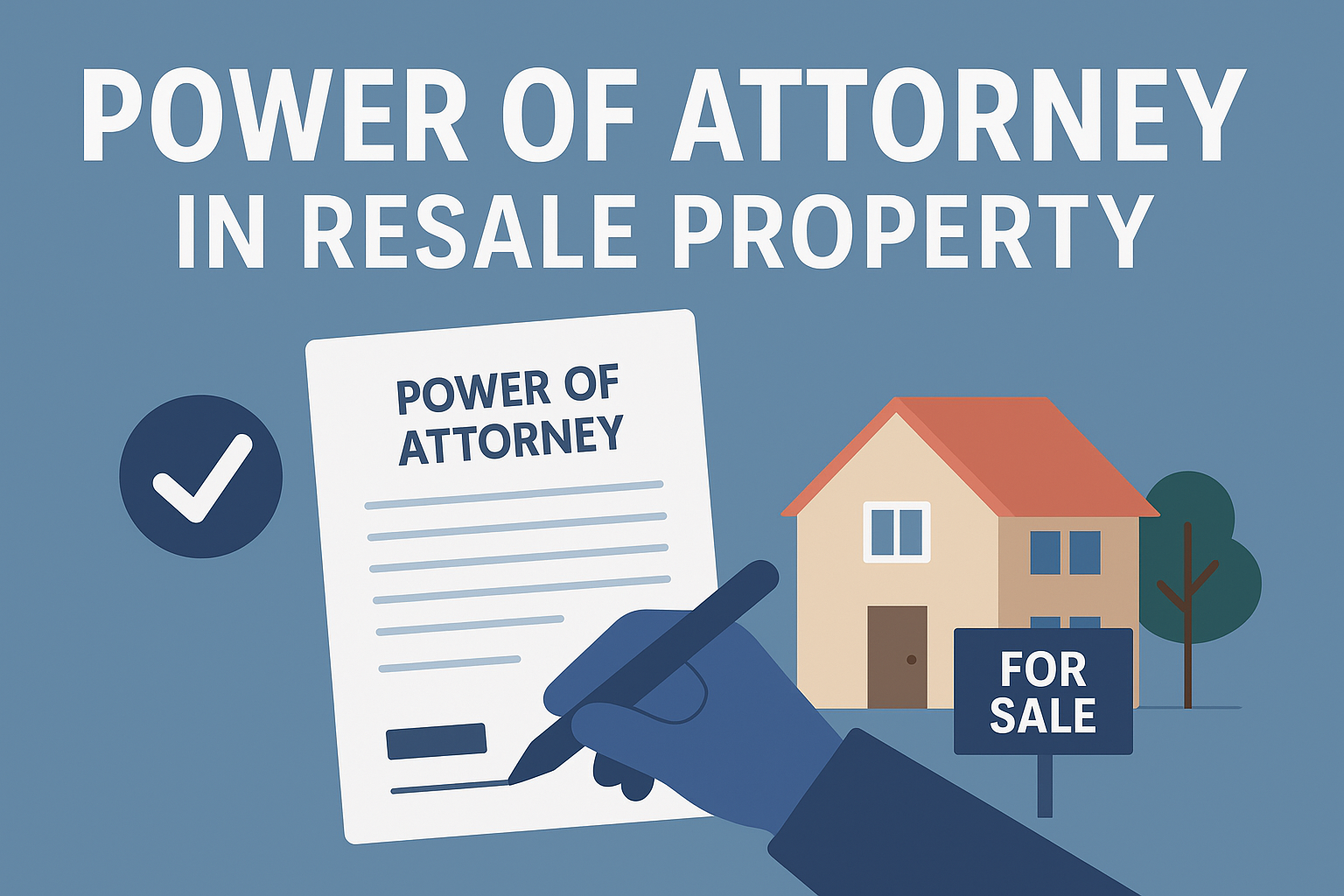When dealing with resale property transactions, many people wonder: “Can I sell or buy a property using Power of Attorney?”
The answer is not simple. While Power of Attorney can authorize someone to act on your behalf, it does not replace a registered sale deed. Therefore, it’s essential to understand how Power of Attorney in resale property works.

What is Power of Attorney in Real Estate?
A Power of Attorney (PoA) is a legal document where the property owner (principal) authorizes another person (agent) to act on their behalf. In resale property deals, this can include:
- Signing property-related documents
- Handling registration formalities
- Representing the owner during transactions
👉 However, it’s important to note that PoA does not transfer ownership rights. Only a registered sale deed can do that.
Is Power of Attorney Valid for Resale Property Transactions?
This is one of the most frequently asked questions.
- Yes, PoA is valid for signing agreements or managing documents.
- No, it cannot serve as ownership transfer in resale property deals.
📌 For example, even if you appoint someone through PoA to sell your flat, the actual transfer of ownership must happen via a registered sale deed at the sub-registrar’s office.
Risks of Using Power of Attorney in Property Resale
If you’re asking, “Is it safe to buy a property through Power of Attorney?”, the answer is mostly No. Here’s why:
- PoA can be revoked anytime by the owner.
- Banks usually do not approve loans for properties sold solely on PoA.
- The Supreme Court of India has ruled that PoA-based sales are not legal property transfers.
- Legal disputes may arise in future if you rely only on PoA.
How to Use Power of Attorney in Property Deals Safely
While risky, PoA can still be useful, especially for NRIs or those who can’t attend the transaction physically. Therefore, consider the following steps:
- Draft a Registered PoA – Ensure it is legally registered and notarized.
- Use it only for representation – Ownership transfer must still happen through a registered sale deed.
- Verify property documents carefully – Title deed, encumbrance certificate, and prior sale deeds are critical.
- Consult a property lawyer – This ensures legal protection and avoids future disputes.
👉 In short, PoA can assist in the process, but it cannot replace the sale deed in resale property transactions.
Difference Between Power of Attorney and Sale Deed in Property Transactions
| Aspect | Power of Attorney (PoA) | Sale Deed |
|---|---|---|
| Purpose | Authorization to act on behalf | Legal transfer of ownership |
| Validity | Can be revoked anytime | Permanent and binding |
| Ownership | Does not transfer ownership | Transfers ownership |
| Bank Loan | Not accepted by banks | Accepted |
FAQs on Power of Attorney in Resale Property
1. Can I sell my flat through Power of Attorney?
Yes, you can authorize someone to represent you, but the ownership transfer requires a registered sale deed.
2. Is it safe to buy a resale property with Power of Attorney?
No, it’s risky. Always insist on a registered sale deed for legal ownership.
3. Do banks approve loans for properties bought with Power of Attorney?
Generally, no. Banks require a registered sale deed for loan sanction.
4. Can NRIs use Power of Attorney in resale property transactions?
Yes, NRIs often use it for representation, but the final sale must happen through a sale deed.
Q: Can I sell a resale property with Power of Attorney?
👉 You can authorize someone to handle documentation and representation, but the ownership transfer is only valid through a registered sale deed, not PoA.
Final Thoughts
In conclusion, Power of Attorney can be a helpful tool for representation in resale property deals, especially for NRIs or those unable to attend physically. However, it cannot replace a sale deed for ownership transfer.
✅ Always complete the sale through a registered sale deed.
✅ Consult a legal expert before entering into PoA-based transactions.
✅ Use PoA only as a supporting tool, not as proof of ownership transfer.

Join The Discussion